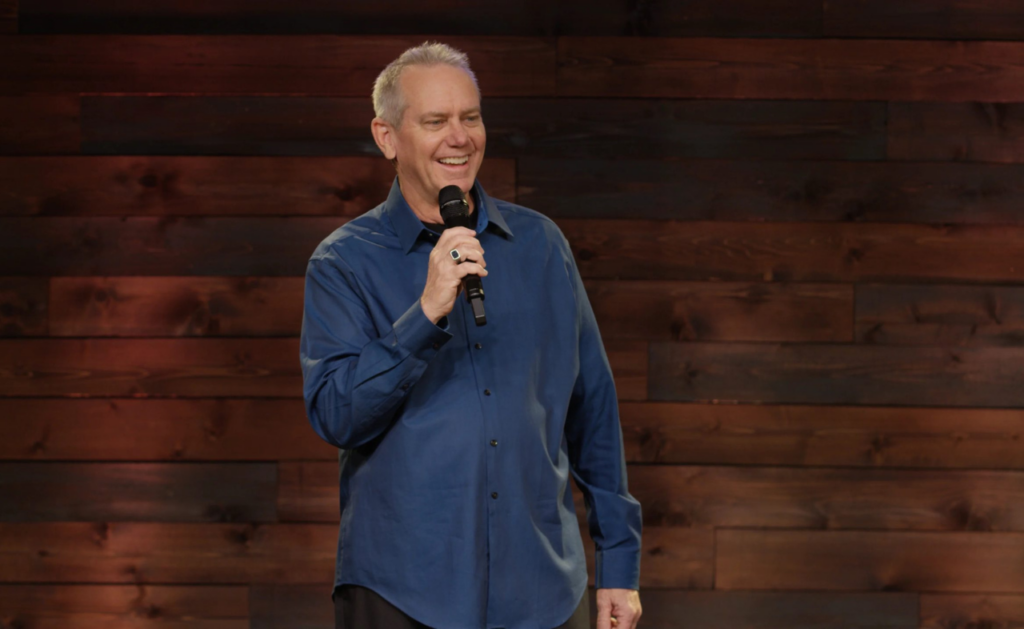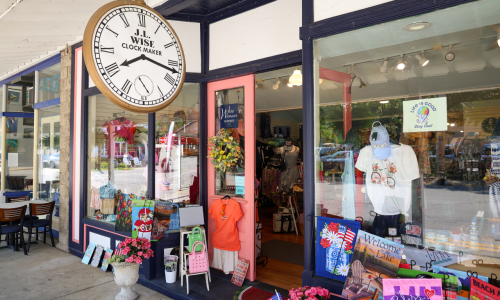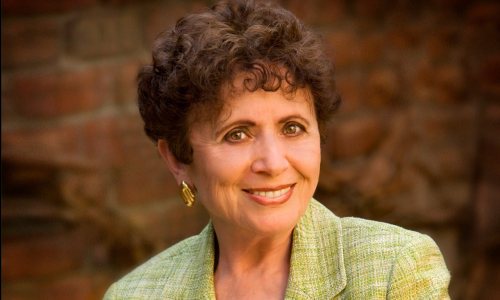By Kevin Greer
Lakeside Communications Manager
Accomplished comedian Dennis Regan will bring his hilarious stand-up show to Orchestra Hall at 7:30 p.m. Saturday, Sept. 14.
Regan was born and raised in Miami, but didn’t start stand-up comedy until his early 30s. Before that, he had many different jobs, including an asphalt business with his dad called Tars and Stripes.
Regan hit his first open mic night at Coconuts Comedy Club in North Miami in 1987. Four months later, he won a local contest. The next year, Regan moved to New York City and broke into the main lineup of all the iconic clubs: The Improv, The Comic Strip, The Comedy Cellar, Catch a Rising Star and Dangerfield’s.
His television credits include multiple appearances on “The Late Show with David Letterman,” “The Tonight Show with Jay Leno,” A&E’s “Evening at the Improv,” Comedy Central and Showtime.
Regan wrote for the popular Kevin James sitcom “The King of Queens” from 2004-2007.
Audiences all over the country have experienced Regan’s comedy, from nightclubs and cruise ships to colleges and corporations. He has even performed at Carnegie Hall.
Regan spent a few minutes talking with The Lakesider Newspaper about his labor and comedy careers and other topics.
Have you ever been to Lakeside?
Regan: No. I saw the website and it looks like an interesting and fun place. I’ve performed in Cleveland, Columbus and Detroit. I worked Hilarities in Cleveland, which is a great club. I like it up there.
Before you became a comedian, you did a little bit of everything.
Regan: I have quite a diverse career and bounced around. That’s a negative connotation, but it’s not like I couldn’t hold a job. I did construction, hung drywall, was a waiter, threw bags around for Eastern Airlines, was an exterminator and a paver.
Did you enjoy them?
Regan: I enjoyed most of them to some degree. The bags fighting gravity isn’t too much fun on your back, but I was young when I was doing that. I grew up working. My dad had a different idea about what Saturdays were for, like cutting the hedges and going to the dump. There’s a little bit of my dad in me. I enjoy physical labor more than stressful stuff. I don’t like having 15 things to do on my calendar. I see people doing those types of jobs and spinning in place, and I would not fare well with that.
While you’re on the job or in school, did you do a lot of joking?
Regan: I was never considered the class clown or anything like that, but I enjoyed being a smart aleck. Being a comedian seemed so otherworldly to me. There were comedians I saw on TV like Don Rickles or Buddy Hackett, and that just seemed like a different realm of funny. It wasn’t until the 1980s when my brother, Brian, was having a good time doing it. I saw some other guys who I didn’t think were very funny. I thought, ‘Well, I don’t know if I’m funny enough for this, but I know I’m probably funnier than that guy.’ I tried open mic night, and I’ve enjoyed it ever since. I think I was influenced by the Smothers Brothers without even knowing about it. When I started doing comedy, I had kind of a Tommy Smothers character. That lasted less than a year, and it sort of morphed into just me being myself.
You didn’t start comedy until your early 30s. Did you think you were behind?
Regan: I didn’t think that I was behind because I had a certain confidence. I don’t mean confidence so much in that I was good at comedy, but I had a worldly confidence that helped me. There are times now when I think, ‘What might have happened if I started earlier?’ I don’t harp on it too much. I’m happy with the way things went for me. It’s never been my philosophy that you have to be the best at everything. I think it’s idiotic. Everybody playing baseball isn’t the best, so should they quit if they’re not the best? No. You just give your best and see what happens, and that’s what I’ve enjoyed doing.
What was your first night on stage like?
Regan: It was kind of mind-blowing. It might seem obvious, but the thing that struck me the most was the focus. When you go on stage at a comedy club and you’ve got eyeballs on you, and everybody is like, ‘Ok pal, we’re ready. Go.’ You’re like, ‘Holy crap.’ It’s close to overwhelming. This is an audience of strangers, and you have to set everything up in a way that they will get it at the same time. Comedy is a different thing than just being funny. Some people go up and they think because they’re funny in school or with their friends, they’ll be good at this. They have to learn that’s not the case.
What topics did you discuss in that first experience on stage?
Regan: It was Christmas time and I had to follow Santa Claus. It was this little goof they did with the owner. I remember being amused by that, because I knew as they say in show business, ‘Don’t follow children or animals.’ Now I’m following Santa Claus my first time. He’s been bringing them gifts their whole lives, so the audience already loves him. I didn’t have that going for me. I was afraid I’d go blank, so I wanted to have a cheat sheet if I needed it. I didn’t want to stand up there and stare into space. I was introduced as my first time on stage. I pretended like I went blank, then I pulled index cards out of my hand, and I got a laugh, just from that. I looked at the cards and said, ‘Hello.’ Then I turned the first card over, and it said, ‘Hello’ in big block letters, and that got a big laugh. That was not a bit that I could ever do again because it was just for that moment. I did well enough to want to go back.
When you won that contest after just four months, was that when you knew you were good?
Regan: It was about six months in. I went to a club and nobody did very well. It was a small crowd, maybe like 16. People think it’s hard to go up in front of a big audience, but a smaller audience is harder. All the other comedians said, ‘This crowd sucks,’ and I was going up kind of late, but I pulled it off. I came off thinking, ‘I think I might have what it takes to do this.’
When were you able to quit the labor jobs?
Regan: I moved to New York about a year and a half after I started doing comedy. Brian was renting a room in Queens and was moving to Manhattan and I could have that room for a month. I went there because you don’t get those sorts of opportunities very often. I had to tell my dad I was cutting out of the asphalt business we had started, and he was dependent on me for the physical labor. We’re sitting in the truck, and he said, ‘Dennis, if I could make a living telling people jokes, that’s what I would do.’ Even though he was going to take a hit, he was very supportive of me.
Was that the reaction you expected from your dad?
Regan: I don’t think so. I was afraid to tell him. He’d always had kind of a dream of working with his sons in a business. He retired from airlines after 30 years, and I was the only one who signed up for this work, which I hated.
How long did it take for you to get noticed in New York?
Regan: I had good luck breaking into the clubs almost immediately. What I mean is, they have these late-night spots where you can go on, like 1:45 a.m., sometimes later. Generally, the crowd is gone after midnight and you’re getting these people coming in for just a couple of late-night laughs. You work those late weeknights and if you prove yourself, they might give you an early spot, and that’s what happened to me. You might have three sets at three different clubs in the same night. The most I ever did was a Wednesday night when I did five sets at five clubs. Then you work your way into the weekends and then you could make a couple of bucks, because they pay you $50 or $60 a set, and you’ll be riding cabs all over town. It was really sort of hellacious.
What’s it like to get that phone call from a representative from Leno or Letterman asking you to go on the show?
Regan: I had done Leno a couple of times, and generally, it’s so stepped out that it’s not a fabulous moment in your life. They think you’re right, but you’re not ready. They’re going to give you a date, then they’re not sure of the date. Here’s how I got to be on Letterman. I opened for Ray Romano at Carnegie Hall. I had a great set, and Letterman’s producers were there because it was Ray’s show. I was in the dressing room with one of my buddies and the Letterman people came up, introduced themselves and said, ‘We want to have you on our show.’ I was like, ‘Wow, cool. You got it.’ That was a great moment. When comedians would ask me how to get Letterman, I say, ‘Well, get yourself a set at Carnegie Hall and kill it in front of the Letterman people.’
How do you keep your comedy clean?
Regan: When I started, I thought I was going to be dirtier. I swear offstage and it’s just a part of my speaking vernacular. I have five brothers and we swear. I would do a joke, say the f-word and it would get a laugh. The next time I tried without it, and it didn’t. Then I’m thinking, ‘So what are they laughing at?’ It was kind of like a 5-year-old saying ‘doo doo’ and making them laugh. I wanted to use the language better, and I wanted to appreciate comedy more. People sometimes think you’re religious or you want to do church shows. It’s just the way I feel about comedy. I saw some people who were very dirty, but very funny, and I appreciate it. To me, in a lot of ways, it’s kind of like steroids. If they have a competition where you’re not allowed to use steroids, different people will win than people who win if they allow it. I like being somebody who doesn’t use steroids. I don’t like to be marketed or booked as a clean comedian unless that’s what’s important to them. When I go to a club and they say, ‘clean comedian,’ it ticks me off. That doesn’t pull people in. I’ll make them all laugh, and they won’t even know it wasn’t dirty. That’s how proud I am of how strong I’ve gotten. I just like to do a show where people don’t feel like they have to take a shower afterward.
Did you do a lot of writing before joining “King of Queens?”
Regan: None. I walked into that. I don’t know how I got it either, because there are a lot of people pursuing those sorts of jobs. I think Kevin James and his team were impressed with my comedy. They wanted to bring in some new meat that was funny. There wasn’t much pressure on me. I was just learning the ropes the first couple of years. I know that I became a much better comedian because I was there. There were 12 other writers, and sometimes we weren’t in the same room at the same time. They were brilliant comedic minds, and I learned a lot of things that I would not have learned if I was just left to my own devices.
How often do you still travel to do shows?
Regan: I’d say about a third of the time. I’m living in Tampa, Florida, and I do stuff around here. I don’t do a ton of comedy clubs anymore because I sort of outgrew them age-wise and money-wise. I was working on cruise ships for a while, but I don’t think I’ll do that anymore. I’ve been lucky in my career. I never got big, rich, famous or anything like that, but I’ve been able to work. I’m just keeping at it at the pace that I want to and not getting on airplanes every 20 minutes.
Do you still do shows with your brother?
Regan: Once in a while. I like his crowds. It was a cakewalk for me to go out and open for him. It’s just that I have to do my own thing.
Are you funnier than Brian?
Regan: I’m smarter. We’ve never really been competitive about comedy, but we’ve always been competitive about other things. One time we were in a swimming pool and we had this contest to see which one of us could hold his head underwater the longest. Brian was able to hold his head underwater for a one minute, and I was able to hold his head underwater for two full minutes. That’s a joke I’ve told many times.
Purchase tickets online – buy one ticket for $25 and get the second one free! Adults, youth and children, regardless of age, are required to have a show ticket. Gate and Parking Passes to enter Lakeside Chautauqua are not required for this fall weekend. A Season Chautauqua Pass is not valid for this fall show.




